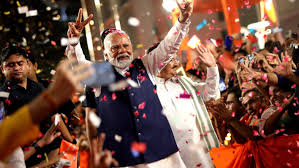Modi’s Plan to Synchronise Elections Across India Sparks Backlash
Politics Politics of IndiaPosted by NewAdmin on 2025-02-03 08:48:21 |
Share: Facebook | Twitter | Whatsapp | Linkedin Visits: 30

The Indian government, led by Prime Minister Narendra Modi, has reignited discussions about implementing a "One Nation, One Election" policy—an ambitious plan to synchronize elections across the country. If implemented, this would mean that elections for the Lok Sabha (Parliament), State Assemblies, and possibly even local bodies would be held simultaneously across all states. While the government argues that this move would enhance governance, reduce election-related expenses, and ensure political stability, the proposal has sparked significant criticism from opposition parties, political analysts, and regional leaders.
What is ‘One Nation, One Election’?
The concept of One Nation, One Election proposes that elections for the Lok Sabha and all State Assemblies be conducted at the same time, once every five years. Currently, India follows a staggered election system, where different states hold elections at different times, sometimes leading to a continuous election cycle. The proposed reform aims to bring uniformity and efficiency to the electoral process.
Proponents of the idea argue that frequent elections lead to governance disruptions, policy delays, and a financial burden on the government due to recurring election expenses. They also highlight the impact of the Model Code of Conduct (MCC), which comes into effect during elections and restricts the government from announcing new policies and developmental schemes, causing delays in governance.
The Government’s Justification for the Plan
The Modi government has put forth several reasons in favor of synchronizing elections:
Cost Reduction: Conducting elections across states at different times results in massive expenditure on logistics, security, and election commission operations. A unified election would significantly cut costs.
Better Governance: Continuous elections lead to political instability, with governments focusing on short-term electoral gains rather than long-term policy-making. A five-year stable period would allow for uninterrupted governance.
Less Burden on Security Forces: Security personnel, including paramilitary forces and police, are frequently deployed for elections, disrupting law enforcement duties. A synchronized election would reduce the strain on these forces.
Increased Voter Turnout: Supporters claim that a single election day could improve voter participation, as citizens would be more engaged in a consolidated voting process.
The Backlash and Criticism
Despite the government’s strong advocacy, the proposal has faced intense opposition from several quarters:
1. Constitutional and Legal Challenges
Critics argue that implementing simultaneous elections would require significant constitutional amendments, particularly altering Articles 83, 172, 324, and other provisions governing the tenure of legislatures. Since state assemblies dissolve at different times based on political circumstances, forcing them into a fixed five-year election cycle would be legally complex.
2. Federalism Concerns
India follows a federal structure, where both the central and state governments have independent roles. Many regional leaders, including Tamil Nadu’s DMK, West Bengal’s TMC, and Telangana’s BRS, argue that synchronizing elections undermines state autonomy by forcing state governments to align their electoral cycles with national politics.
3. Impact on Regional Parties
Smaller and regional parties fear that a synchronized election would favor national parties, especially the BJP and Congress, which have greater financial and organizational strength. In a joint election, national issues might overshadow regional concerns, reducing the importance of state-level governance.
4. Disruption of Elected Governments
If all elections were to be held simultaneously, it could lead to situations where a state government might have to be dissolved early to match the national election cycle. This could be seen as undemocratic and unfair, especially if an elected government is forced out before completing its full term.
5. Logistical and Operational Challenges
Organizing elections across 28 states and 8 Union Territories at the same time is a massive logistical challenge. The Election Commission would need to mobilize resources, security forces, and voting infrastructure on an unprecedented scale, raising concerns about the feasibility of such a plan.
Opposition’s Response
Several opposition parties, including the Indian National Congress (INC), Trinamool Congress (TMC), and Aam Aadmi Party (AAP), have strongly opposed the proposal, calling it an attempt to centralize power. Congress leader Rahul Gandhi has criticized the move, stating that it undermines India's diverse political landscape. West Bengal Chief Minister Mamata Banerjee has also condemned the plan, arguing that it weakens democracy by limiting state governments' autonomy.
Expert Opinions
Constitutional experts and former election commissioners have expressed mixed views. Some acknowledge the economic benefits of synchronized elections but highlight the legal and democratic hurdles. Former Chief Election Commissioner S.Y. Quraishi has pointed out that while a discussion on election reforms is welcome, imposing a uniform electoral schedule on states is neither practical nor constitutionally viable without broad political consensus.
Current Status of the Proposal
The Modi government has formed a high-level committee, headed by former President Ram Nath Kovind, to examine the feasibility of the One Nation, One Election policy. The committee will analyze the constitutional, legal, and logistical challenges and submit recommendations. However, given the strong opposition, implementing such a policy would require extensive political negotiations and constitutional amendments, making it unlikely in the near future.
Search
Categories
Recent News
- Rajasthan's Ram Katha U-Turn: Teachers Recalled from Religious Event
- Earth's Atmosphere: A Cosmic Balancing Act
- Indian Shooting Triumphs: Rana's Bronze and Team Silver
- Andhra Pradesh MLA's Unique Scooter Inspection Tour
- Air India's Fuel Switch Woes: A Troubling Pattern
- Mamata Banerjee's Supreme Court Showdown: A Battle for Democracy
- AP EAPCET 2026: Unlocking Andhra Pradesh's Engineering Aspirations
- Fatal Leap: Man's Tragic Encounter with Overhead Wires
Popular News
- Navigating IPO Market Dynamics Amid Volatility and Regulatory Changes
- Massive Worldwide Microsoft Outage Disrupts Multiple Sectors
- Panjapur Bus Stand to Reshape TNSTC Routes
- తెలుగుదేశం పార్టీ - పేదరికాన్ని నిర్మూలించడంలో వాగ్దానం
- Universities Embrace Remote Learning Technologies Amidst Ongoing Pandemic